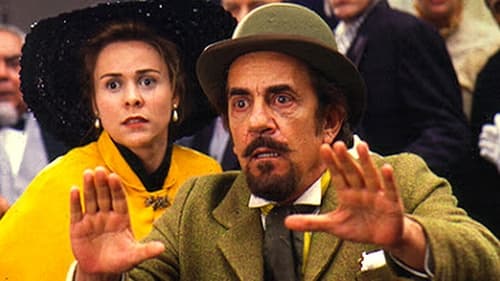Fernando Eiras
出生 : 1957-02-21, Rio de Janeiro, Rio de Janeiro, Brazil

Dr. Lauro
Augusto moves with his family to an abandoned farm, inherited from his grandfather, hoping to put his life back on track. The property, however, carries the karma of the betrayal of the slave Couraça who seeks revenge against Augusto's family.

Joesley Castro Magalhães
Hebe Camargo is one of the most emblematic entertainments in Brazil. At her 60s, she went on to control her own career and, despite the criticism, the dreadful husband and the powerful and sexist bosses, she revealed herself to the public as an extraordinary woman, capable of overcoming any personal or professional crisis.

Marcos Sá
A history of vendetta and redemption occurs in the vicinity of a road, when the trajectory of a young policeman from the Capital intersects with a sergeant.

Winston Fritsch
In May 1993, Brazil experienced one of the worst economic crises in its history. The government then decides to set up a real task force to solve the problem. Confined to a bunker as a way of shielding the operations of growing political pressures, the special economic team will have to do its best to reach agreement and create the Plano Real.

A curious couple, whose existence takes place where art arises along a singular metaphysical desire. They search for it through repeated and varied representations, in a setting of light where hope and desperation blend together.

Mário Magalhães
After being released from prison, Dr. Nise da Silveira is back at work in a psychiatric hospital on the outskirts of Rio de Janeiro where she refuses to employ the new and violent electroshock in the treatment of schizophrenics. Ridiculed by doctors, she is forced to take on the abandoned Sector for Occupational Therapy, where she would start a revolution through paintings, animals and love.

They live, they act, they love. Today they remember, they relive, they live through cinema and life.

An essay around the streets, as an homage to Fernando Pessoa

Self
In his film Rua Aperana 52 Júlio Bressane describes the invention of a landscape, the topology of a corner of Rio de Janeiro. The film consists of a series of photographs taken between 1909 and 1955 by, among others, Bressane's parents at and around the address used as a title. These are interlarded with scenes from films made between 1957 and 2005, bringing the total fictional time the film covers to almost a century; one hundred years in which the winding road featured in almost every shot structures the new landscape behind the Aperana, which means 'wrong road'. Rua Aperana 52 is autobiographical, as it is a landscape from Bressane's youth, but it is also not so; it is more a multi-subjective mythology of a place seen through all those films and photographs. Bressane refers to his editing as an intuitive form of thinking aimed at evoking moods which make the viewer the new witness of the fictional landscape. A fiction about a fiction,

Francisco Alves
The singer Dalva de Oliveira and the composer Herivelto Martins lived intensely on the stage and in life. The 13 years of marriage and the disagreements, which gained emphasis with the separation, contributed to an important artistic and cultural production.

Fernando Sabino
Mixed with fiction and documentary, the film relives the interviews conducted by the writer Clarice Lispector published in the magazines "Manchete" and "Fatos and Fotos" in the 1970s.

Mário

Betty, a famous brasilian 'telenovelas' star, is in search of her twin sister Marlene, who vanished when the kids were four years old (Marlene is now a prostitute). Fragments of other stories, like that of an italian traveller Filippo who left in Italy Giuli, pregnant, and claims to have a split-personality, are inter-twined with the main one

Gaspar
Three friends, Hilda, Matilda and Gaspar, meet in a rundown downtown apartment during a weekend to chat, drink and experience pleasure.

Friedrich Nietzsche
A cinematographic essay, without dialogues, about the months Nietszche spent in Turin, Italy, with narration quoted by his original writings.

Armando Borges
Policarpo is a chauvinistic patriot, a major who tries to find solutions for Brazilian problems using only the resources of his own country. His visionary and idealistic temperament is behind his strange ideas about how to build a great nation.

Mário Reis
The history of Brazilian popular music in the 20th Century, focusing specially on the life and works of intriguing singer Mário Reis, a loner who, with his special way of singing - whispering and softly saying the words - in a time when singers with potent voices ruled, was in a way a forerunner of Bossa Nova style.














